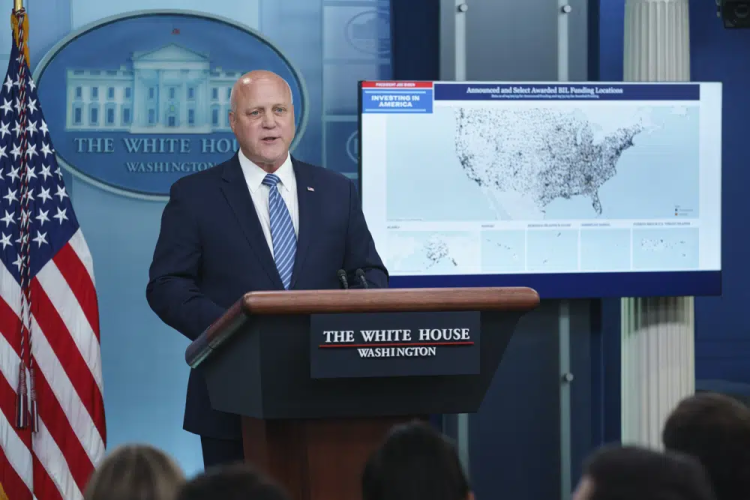A significant milestone was achieved in the extensive nationwide initiative to bring internet access to every household in the United States. On Friday, the Department of Commerce announced the allocation of $930 million in grants to address connectivity gaps in remote regions of Alaska, rural areas in Texas, and numerous other underserved locations.
These grants, referred to as middle mile grants, aim to establish comprehensive networks that will facilitate retail broadband providers in connecting subscribers to the internet. The Department officials drew a parallel between the middle mile and the interstate highway system, highlighting its crucial role in fostering connections between communities. Similar to how the interstate highways enabled transportation and communication, the middle mile comprises high-capacity fiber lines that transmit vast volumes of data at incredibly high speeds.
During a media Zoom call, Mitch Landrieu, the White House’s infrastructure coordinator, emphasized the significance of these networks as the backbone for carrying substantial data across extensive distances. They play a crucial role in bridging the gap between larger networks and the last mile connections, effectively extending connectivity from tribal lands to underserved rural and remote areas. Moreover, they serve essential institutions such as hospitals, schools, libraries, and major businesses.
On Friday, a major advancement was made in the extensive federal initiative to provide internet access to every household in the United States. The Department of Commerce announced grants totaling $930 million, specifically targeting remote areas of Alaska, rural regions in Texas, and various other locations where significant connectivity gaps persist.
These grants, known as middle mile grants, have the purpose of establishing large-scale networks that will facilitate retail broadband providers in connecting subscribers to the internet. Department officials likened the middle mile to the vital midsection of infrastructure required for internet access. It consists of high-capacity fiber lines capable of transmitting enormous amounts of data at incredibly high speeds. They drew a parallel between this infrastructure and the interstate highway system, highlighting its role in forging connections between communities.
During a media Zoom call, Mitch Landrieu, the White House’s infrastructure coordinator, underscored the importance of these networks. He described them as the workhorses responsible for carrying substantial amounts of data over long distances. They serve as a critical link between larger networks and the final connections that reach tribal lands, underserved rural and remote areas, as well as essential institutions like hospitals, schools, libraries, and major businesses.
A diverse range of recipients, including state government agencies, tribal governments, telephone companies, and electric cooperatives, were awarded the grants. These grants aim to catalyze the deployment of approximately 12,000 miles (19,300 kilometers) of new fiber optic infrastructure across 35 states and Puerto Rico.
The most substantial grant, amounting to nearly $89 million, was allocated to an Alaska-based telecommunications company. The company’s objective is to construct a fiber network in a remote area of the state where approximately 55% of the population currently lacks access to basic internet services.
The expansion of high-speed internet connectivity across the country is part of a series of initiatives championed by President Joe Biden’s administration and supported by Congress. These initiatives aim to ensure universal access to broadband services.
Assistant Secretary Alan Davidson of the Department of Commerce described the Middle Mile program as a crucial component in the nationwide connectivity efforts. The grants provided will serve as a catalyst in building the foundational networks necessary to connect every household in the country to affordable, reliable, and high-speed internet service.
The grants were made possible by the allocation of $65 billion by Congress for broadband as part of the $1 trillion infrastructure measure signed into law by President Biden in 2021. A significant portion of this funding, amounting to $42.5 billion, will be distributed to states through the Broadband Equity, Access, and Deployment (BEAD) program. The allocation will be based, in part, on new federal maps that identify areas lacking connectivity.
At the end of this month, the allotments for each state from the BEAD program are expected to be announced. States will then manage their own programs to identify recipients who will be responsible for building out last mile networks, extending internet access to unserved communities.
The recipients of the middle mile grants, which were announced on Friday, will be given a timeframe of up to five years to finalize their projects after receiving the funds. However, in specific circumstances, they may request a one-year extension to complete their projects. This flexibility allows grant recipients to effectively plan, execute, and implement their initiatives while considering any potential challenges or unforeseen circumstances that may arise during the process.








